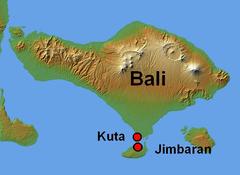Tuban Badung Indonesia Visiting Hours, Tickets, and Historical Sites Guide
Date: 04/07/2025
Introduction to Tuban Badung: History, Culture, and Visitor Essentials
Located in the vibrant Kuta district of Bali’s Badung Regency, Tuban is a destination where historical legacy and modern tourism intersect. The name “Tuban,” meaning “to flow” in Balinese, highlights its coastal heritage and longstanding role as a maritime hub. Historically, Tuban thrived on ancient trade routes and absorbed influences from Java, China, and European colonial powers—shaping its diverse culture and economic activities (travelerbibles.com).
Today, Tuban is recognized for its strategic location near I Gusti Ngurah Rai International Airport, Bali’s main gateway, which has accelerated its transformation into a hotspot for tourism, retail, and cultural experiences (balicabdriver.com). Visitors can enjoy an array of attractions, from the iconic Satria Gatotkaca Statue to world-renowned surfing beaches and cultural landmarks such as Uluwatu Temple and Garuda Wisnu Kencana Cultural Park.
Understanding the cultural roots of Tuban is crucial for a rewarding visit. Deeply rooted in Balinese Hinduism and animist traditions, Tuban’s temples and vibrant festivals—including the Ogoh-Ogoh parade and Siat Api ritual—offer immersive cultural experiences (bali-by-locals.com). Respect for local customs, especially temple etiquette and appropriate dress, fosters meaningful interactions with the community.
This guide provides essential information on Tuban’s history, cultural highlights, top attractions, visitor tips, transportation, accommodation, safety, and local etiquette. Unique experiences such as traditional arts, culinary offerings, family-friendly activities, and wellness options are also covered, allowing travelers to appreciate Tuban’s blend of heritage and modernity. Whether for a short stopover or an extended stay, this resource will help you explore Tuban with confidence and respect (balitravelhub.com; forevervacation.com).
Table of Contents
- Welcome to Tuban, Badung: Your Gateway to Bali’s Heritage and Modernity
- Historical Roots of Tuban, Badung
- Modern Tuban: Urban Transformation and Attractions
- Economic and Social Landscape
- Urban Planning and Environmental Initiatives
- Visitor Information and Tips
- Tuban Cultural Traditions and Visitor Guide
- Visiting the Satria Gatotkaca Statue and Top Attractions
- Essential Visitor Information for Tuban, Badung
- Getting There and Around
- Accommodation and Facilities
- Health, Safety, and Emergency Information
- Entry Requirements and Local Laws
- Dress Code and Temple Etiquette
- Social Etiquette and Cultural Sensitivity
- Shopping and Bargaining
- Environmental and Wildlife Respect
- Festivals and Local Events
- Responsible Tourism
- FAQs
- Conclusion and Call to Action
Welcome to Tuban, Badung: Your Gateway to Bali’s Heritage and Modernity
Tuban is the perfect blend of history and modernity, whether you’re a cultural explorer or a traveler seeking Bali’s best attractions. This guide details everything you need to know—visiting hours, ticket information, cultural highlights, and practical tips—to make your Tuban visit seamless and meaningful.
Historical Roots of Tuban, Badung
Early Development and Cultural Foundations
Tuban’s coastal location made it a natural harbor and center for fishermen and traders, and its evolution from a traditional village was shaped by Balinese Hinduism and animist beliefs. Its temples and shrines remain integral to the community, reflecting centuries of cultural exchange with traders from Java, China, and Europe (travelerbibles.com).
Colonial Era and Infrastructure Growth
The Dutch colonial era brought significant infrastructure, including roads and port facilities, enhancing Tuban’s connectivity. Post-independence, the construction of Bali’s main airport—now I Gusti Ngurah Rai International Airport—marked Tuban’s rise as an economic and transportation gateway (balicabdriver.com).
Modern Tuban: Urban Transformation and Attractions
I Gusti Ngurah Rai International Airport
As Bali’s busiest airport, it has fueled Tuban’s rapid urbanization and growth as a tourism center, with modern hotels, restaurants, and shopping malls catering to global visitors.
Must-Visit Attractions, Visiting Hours & Tickets
- Kuta Beach: Open 24 hours, free entry. Famous for surfing and nightlife.
- Uluwatu Temple: 9 AM–6 PM, entrance IDR 50,000. Guided tours offer deeper insights.
- Garuda Wisnu Kencana Cultural Park: 8 AM–10 PM, tickets IDR 125,000–175,000 depending on the event.
- Local Temples: Open during ceremonies, free entry (donations appreciated). Dress modestly.
Photography Spots
Capture sunrise and sunset by the beaches, bustling street scenes, and vibrant festival moments for memorable photographs.
Economic and Social Landscape
Tuban’s economy is driven by tourism, but also thrives on retail, transportation, and local crafts. Its multicultural community includes Balinese, Javanese, and international residents, enriching its culinary and cultural offerings (balitravelhub.com).
Urban Planning and Environmental Initiatives
To balance growth, local authorities have introduced zoning regulations, infrastructure improvements, and sustainability initiatives such as waste management and coastal protection, mindful of the airport’s environmental impact (forevervacation.com).
Visitor Information and Tips
Transportation and Accessibility
Tuban is easily accessible from the airport via taxi, ride-sharing apps, shuttles, and car rentals (forevervacation.com).
Accommodation and Amenities
Options range from budget guesthouses to luxury resorts, many with airport shuttles and comprehensive facilities (balicabdriver.com).
Safety and Practical Tips
Tuban is generally safe, but travelers should secure valuables and stay informed of local advisories, especially during festivals or peak seasons (investinasia.id).
Cultural Sensitivity
Dress appropriately at religious sites, respect temple etiquette, and engage thoughtfully with local traditions and communities.
Tuban Cultural Traditions and Visitor Guide
Balinese Hinduism and Spiritual Life
Balinese Hinduism shapes Tuban’s daily life, guided by the principle of “Tri Hita Karana”—harmony between people, nature, and the divine (bali-by-locals.com).
Temples and Sacred Sites: Visiting Information
- Pura Dalem Kahyangan: 8 AM–6 PM, free entry (donations welcome), sarong and sash required, often provided (id.wikipedia.org).
- Other temples follow similar hours and etiquette.
Unique Local Traditions and Festivals
- Siat Api (Fire War): Ritual during Pura Dalem Kahyangan’s anniversary.
- Ogoh-Ogoh Festival: Parade held the eve of Nyepi (March-April), featuring giant statues (socialexpat.net).
- Galungan and Kuningan: Major religious festivals celebrated every 210 days.
Arts, Crafts, and Performance Traditions
Tuban is known for woodcarving, painting, and weaving. Local workshops and festivals often feature dance and gamelan performances (bali-by-locals.com).
Social Etiquette and Visitor Participation
- Dress modestly and wear provided sarongs at temples.
- Avoid stepping on offerings.
- Ask before taking photos during ceremonies.
- Greet locals politely and support artisans by purchasing handicrafts.
Practical Tips
- Temple Hours: Usually 8 AM–6 PM.
- Entry Fees: Typically free; donations are customary.
- Best Times to Visit: Align visits with major festivals for a richer experience.
Visiting the Satria Gatotkaca Statue and Top Attractions
Satria Gatotkaca Statue and Park
A striking landmark symbolizing Balinese heroism, located near the airport. Open 24/7, free entry, and wheelchair accessible. Visit at dusk for illuminated views.
Uluwatu Temple Proximity
Uluwatu Temple is about a 30-minute drive from Tuban, open 9 AM–7 PM, entrance IDR 50,000. The site offers nightly Kecak dance performances.
Beaches and Water Activities
- Kelan Beach: Quiet, less crowded; best in early morning/late afternoon.
- Kuta Beach: Popular for surfing and water sports.
- Waterbom Bali: Waterpark open 9 AM–6 PM, tickets IDR 500,000 (adults), IDR 400,000 (children).
Shopping and Entertainment
- Discovery Shopping Mall: 10 AM–10 PM, fully accessible.
- Local Markets: Great for handicrafts and street food.
Family-Friendly Activities
Waterbom Bali, family resorts, and animal encounters at Bali Safari and Marine Park.
Adventure and Outdoor Activities
Surfing, diving, snorkeling, and paragliding are available through local operators.
Wellness and Relaxation
Numerous spas and beachfront relaxation options, with traditional Balinese treatments.
Culinary Experiences
Seafood dining in Jimbaran and diverse restaurants along Jalan Kartika Plaza.
Practical Visitor Information
Airport proximity allows for quick transfers; taxis, ride-shares, and scooter rentals are widely available.
Essential Visitor Information for Tuban, Badung
Getting There and Around
Tuban is minutes from Ngurah Rai International Airport and is well-served by taxis, ride-shares, and hotel shuttles. Scooter and car rentals require an international driving permit (balitraveller.com.au). Traffic congestion can occur during peak times, so plan accordingly.
Accommodation and Facilities
From budget to luxury, accommodations are plentiful. ATMs and reputable money changers are readily available; use cash for smaller purchases (bali.info).
Health, Safety, and Emergency Information
Bali is generally safe, but petty theft can occur. Emergency numbers include police (110), ambulance (118), and fire (113). Drink only bottled or filtered water and use insect repellent to prevent mosquito-borne illness. Travel insurance is highly recommended.
Entry Requirements and Local Laws
Complete the SATUSEHAT Health Pass before arrival. VOA is available for many nationalities; check current requirements (baliuntold.com). Indonesian drug laws are strict; avoid illegal substances.
Dress Code and Temple Etiquette
Modest dress is required at temples. Sarongs and sashes are often provided, but bringing your own is helpful (conscious-explorer.com; backindo.com). Remove shoes before entering temples or homes.
Social Etiquette and Cultural Sensitivity
Be respectful, avoid public displays of affection, use your right hand for giving/receiving, and learn basic Bahasa Indonesia phrases (lodestartravelguide.com; balitraveller.com.au).
Shopping and Bargaining
Bargaining is common in markets. Support local businesses and artisans (balitraveller.com.au).
Environmental and Wildlife Respect
Help preserve Bali’s beauty: avoid littering, use refillable bottles, and do not disturb wildlife or sacred sites (finnsbaliresort.com).
Festivals and Local Events
Tuban hosts vibrant festivals, including Ogoh-Ogoh during Nyepi. Attend respectfully and avoid disrupting ceremonies (baliexpat.com).
Responsible Tourism
Choose eco-friendly accommodations, minimize waste, and participate in community-based tourism to positively impact Tuban.
Frequently Asked Questions (FAQ)
Q: What are the main attraction visiting hours?
A: Kuta Beach is open 24/7; cultural sites like Uluwatu Temple are typically open 9 AM–6/7 PM.
Q: Are entrance fees required?
A: Many attractions are free; temples/parks may charge IDR 50,000–175,000 depending on the site.
Q: How accessible is Tuban?
A: Most public areas are accessible, but some temples have limited access for those with mobility challenges.
Q: When are major festivals held?
A: Ogoh-Ogoh is on the eve of Nyepi (March/April); Galungan and Kuningan occur every 210 days.
Q: Is it safe to drink tap water?
A: No. Drink bottled or filtered water.
Summary
Tuban, Badung offers a unique blend of history, culture, and modern attractions, from its origins as a fishing village to its current status as a transportation and tourism hub (travelerbibles.com; balicabdriver.com). Must-see landmarks include the Satria Gatotkaca Statue and beautiful beaches, as well as vibrant festivals and family-friendly destinations like Waterbom Bali (bali-by-locals.com; socialexpat.net). By following practical guidelines on safety, etiquette, and responsible tourism, visitors can enjoy a rewarding and respectful experience (balitraveller.com.au; conscious-explorer.com). Guided tours, careful planning, and openness to local culture will ensure an unforgettable journey.
Call to Action
Ready to explore Tuban? Download the Audiala app for personalized guides, exclusive deals, and real-time updates. For more tips, check out our related posts on Bali’s cultural sites and follow us on social media for the latest travel inspiration.
References
- Traveler Bibles: Places to Visit Near Ngurah Rai Airport
- Bali Cab Driver: Guide to Ngurah Rai Bali International Airport
- Bali by Locals: Badung Travel Guide
- Social Expat: Ogoh-Ogoh Festival in Bali
- Bali Travel Hub: Events and Attractions
- Invest in Asia: Indonesia Travel Entry Requirements
- Forever Vacation: Ngurah Rai International Airport
- BaliTraveller: Travel Tips for Bali
- Conscious Explorer: Indonesian Etiquette for Tourists
- Bali.info: Tuban
- Bali Untold: Travel Tips
- Backindo: Indonesian Etiquette Guide
- Lodestar Travel Guide: Local Laws and Customs
- Finns Bali Resort: Unique Experiences in Bali
- Bali Expat: Ogoh-Ogoh Competition Coverage



